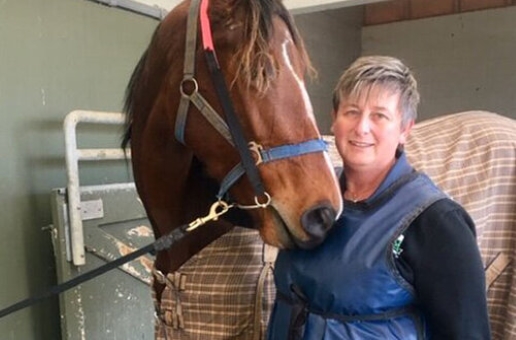Vicki swaps horses for fictional cows and proves diploma is for all
16 December 2019
It’s hard not to feel outnumbered when you’re an equine vet surrounded by dairy and sheep farmers.
 But Vicki Morgan loves a good challenge and knew that enrolling for a diploma from Primary ITO was a smart career move.
But Vicki Morgan loves a good challenge and knew that enrolling for a diploma from Primary ITO was a smart career move.
For two and a half years she diligently attended class alongside farm managers and owners from across the Manawatu to learn the in’s and out’s of running an agribusiness so she could improve her own management skills.
The 49 year-old leads a team of seven equine vets and one equine technician at EquivetsNZ in Bulls and Masterton which is part of Southern Rangitikei Veterinary Services. And while she was able to use her own workplace for the diploma’s human resource and risk management modules, she had to get her head around running a make-believe dairy farm to complete the financial reporting section and prepare a final business case study.
“Just because you don’t have a dairy background, don’t let that stop you,” Vicki says. “The skill base you’ll learn from studying the diploma is applicable in so many industries and jobs. “It’s those little bits of knowledge that you’ll take away that you’ll find helpful in your job, whatever job you do.”
Southern Rangitikei Veterinary Services is a very large practice caring for animals of all shapes and sizes. The business employs a fulltime practice manager who oversees the hiring of new staff but Vicki is still involved in writing job descriptions and the interview process for new equine vets – something which is much easier now she’s completed her diploma studies.
“There’s a lot of do’s and don’ts when it comes to employing people which I found really fascinating,” she says. “It’s good to be aware of those extra steps now and how to obtain a little bit more information about the person’s skills. Knowledge is a good thing but life skills are also really important.”
Vicki says she particularly enjoyed the risk management module which focused on how to prevent certain problems from arising. “That knowledge is something that I use quite a lot at work now to get the staff working together and getting jobs done.
“I’m in charge of stocktaking and I’m more aware of what processes need to be in place before we start to make sure it happens properly on the day, whereas before we use to sort of just wing it.” Putting key people into key roles before she begins means this year’s stocktake ran more smoothly than ever before. “They’re really small things but they actually make a big difference.”
Vicki’s newfound knowledge on how to prepare budgets and forecasts has also helped EquivetsNZ launch a new service to the region’s prestigious Nga Tawa Diocesan School which runs a popular equestrian programme.
“We decided this year to put in place a health plan for the girls’ horses to ensure we’re offering them the best care. I had to do a budget working out what we could offer in terms of dental, vaccinations and general health checks. It ensures we’re getting these girls on board and they’re following up with the health care of their horses. We’re there at the school twice a week to offer that service and we’ve had a really good response.”
Vicki acknowledges having support from your employer is crucial when studying the diploma. She needed time off to attend class either weekly or fortnightly, plus study groups, but Southern Rangitikei Veterinary Services also gained a lot from her efforts.
“I was able to do a risk assessment on our business when we were opening up our new equine branch in Masterton. I assessed whether it was going to work down there, was this business going to be viable, how can we do marketing and things like that.”
While her classmates concentrated on developing financial and business plans for their own farms, Vicki was given ‘scenario farms’ by her tutors with made-up figures. “The support I got from the production vets at work was just fantastic. I’d go to them and say ‘on my make-believe farm I’ve got this many cows and I need to do this many kgs in milk solids, so how many cows should I be milking? I honestly had no idea, but now I do. Now I have a really good idea.”
Having mastered the art of forecasting budgets, and understanding how and why things must be done a certain way, Vicki is now looking forward to helping her colleagues prepare budgets for their individual departments within the vet clinic.
“I didn’t know a great deal about Xcel spreadsheets and forward planning so all that sort of stuff was a shock to the system. There’s a lot of numbers to work out. But I had a lot of help from people at work and from my fellow class members.
“That’s the best thing about doing that diploma – actually sitting in a classroom with like-minded people. We had sheep and beef guys and some dairy people. They were amazing because they were talking in a different lingo from me and I’d be like ‘what do you mean?’ but they were so good. It was fabulous how everyone helped each other out.”
Vicki says study has given her the ability to “sit back and look at the big picture”. Adapting the course work to the equine vet industry has taught her to think outside of the box, and given her confidence to take on new challenges.
“People should just do it, it’s a fantastic diploma. “The help the Primary ITO tutors give you is amazing and that makes doing it a lot less stressful.”
